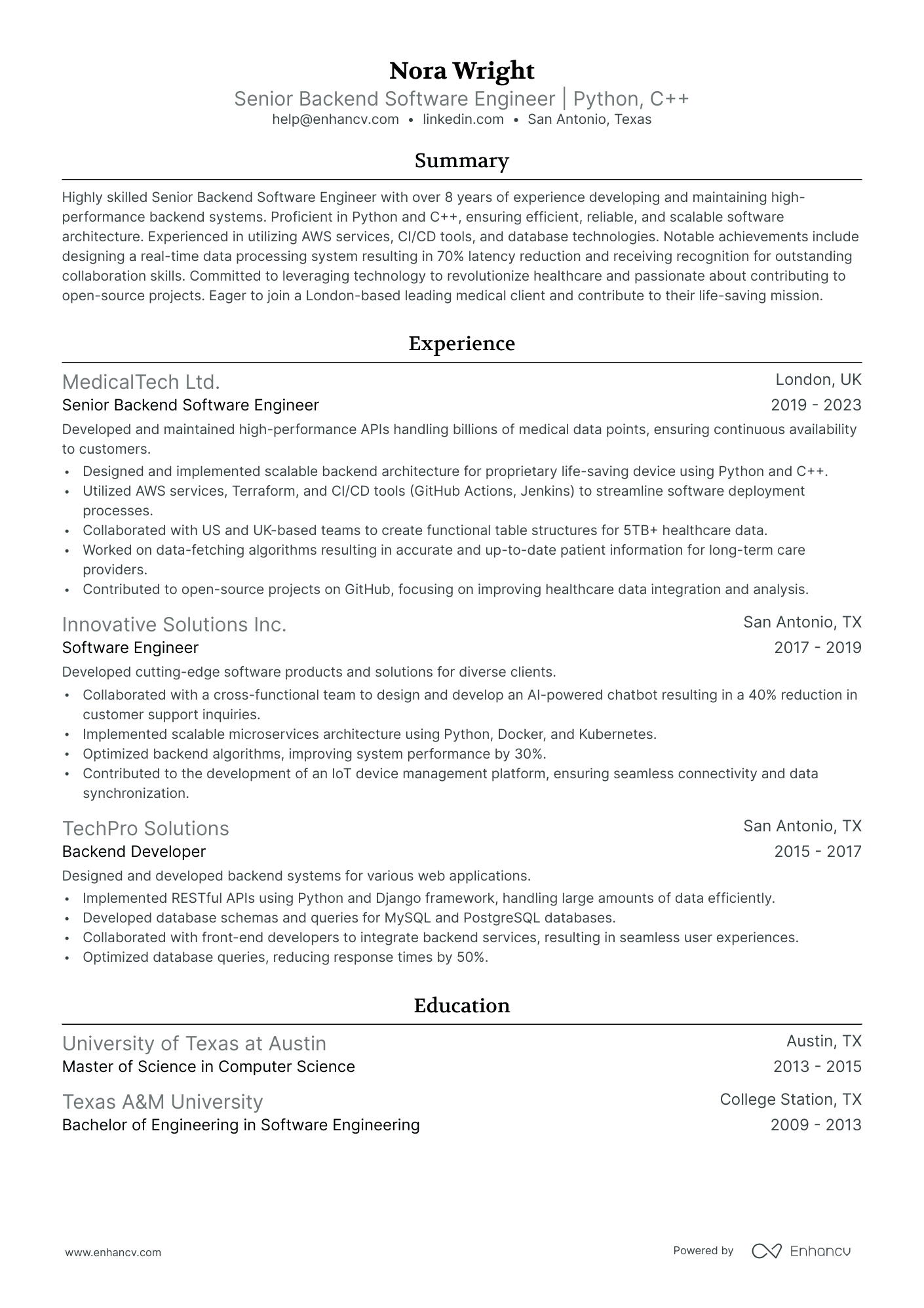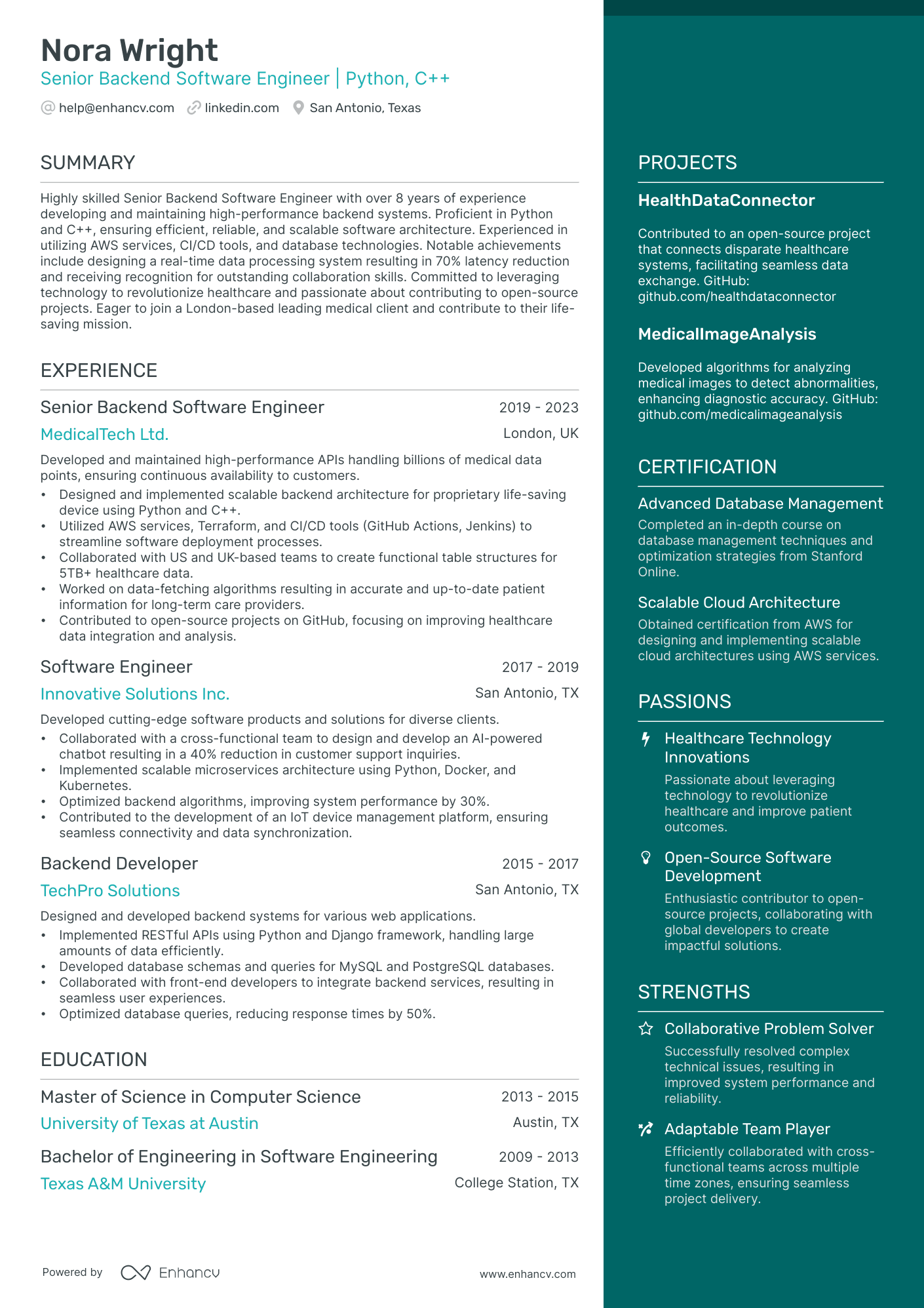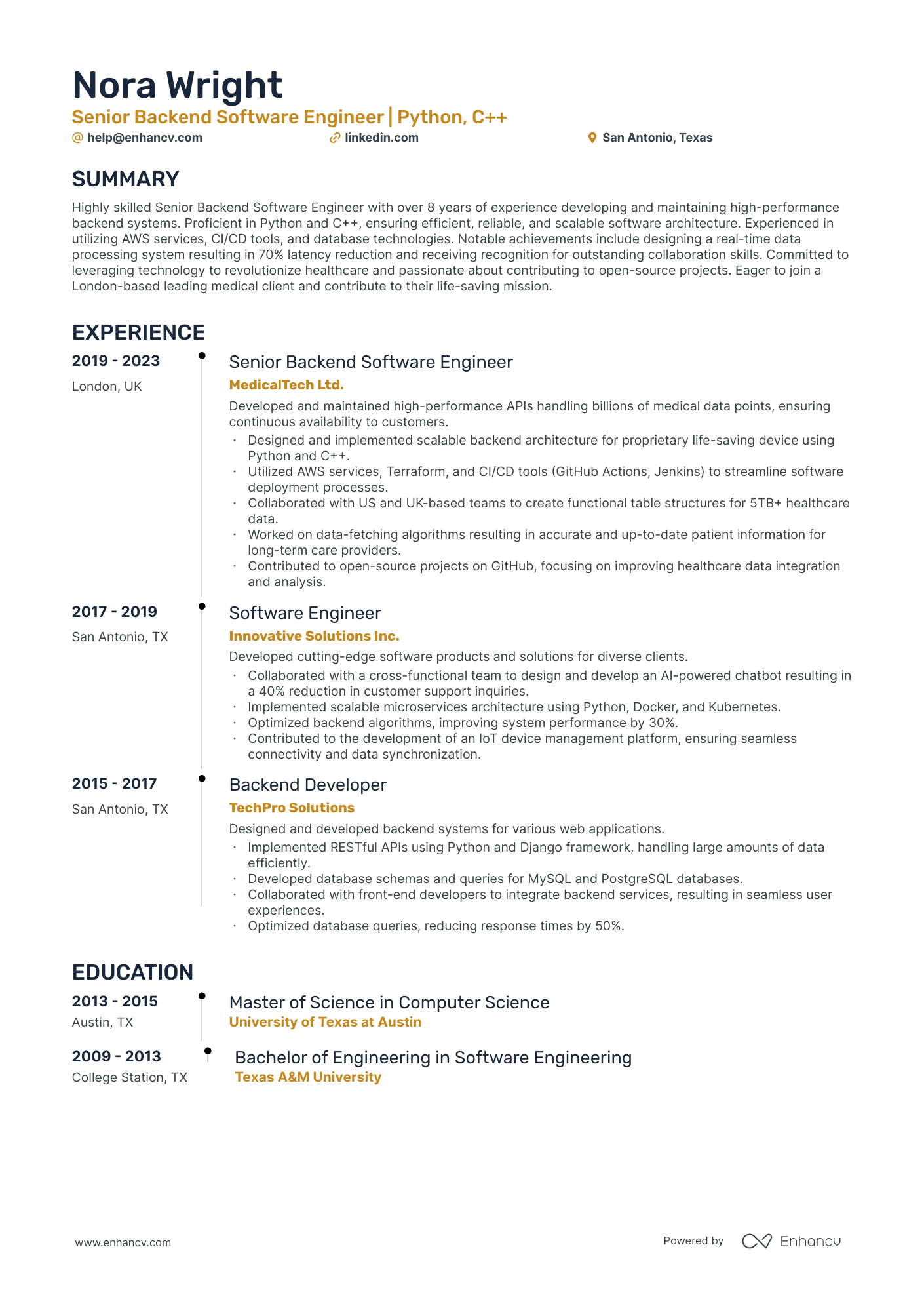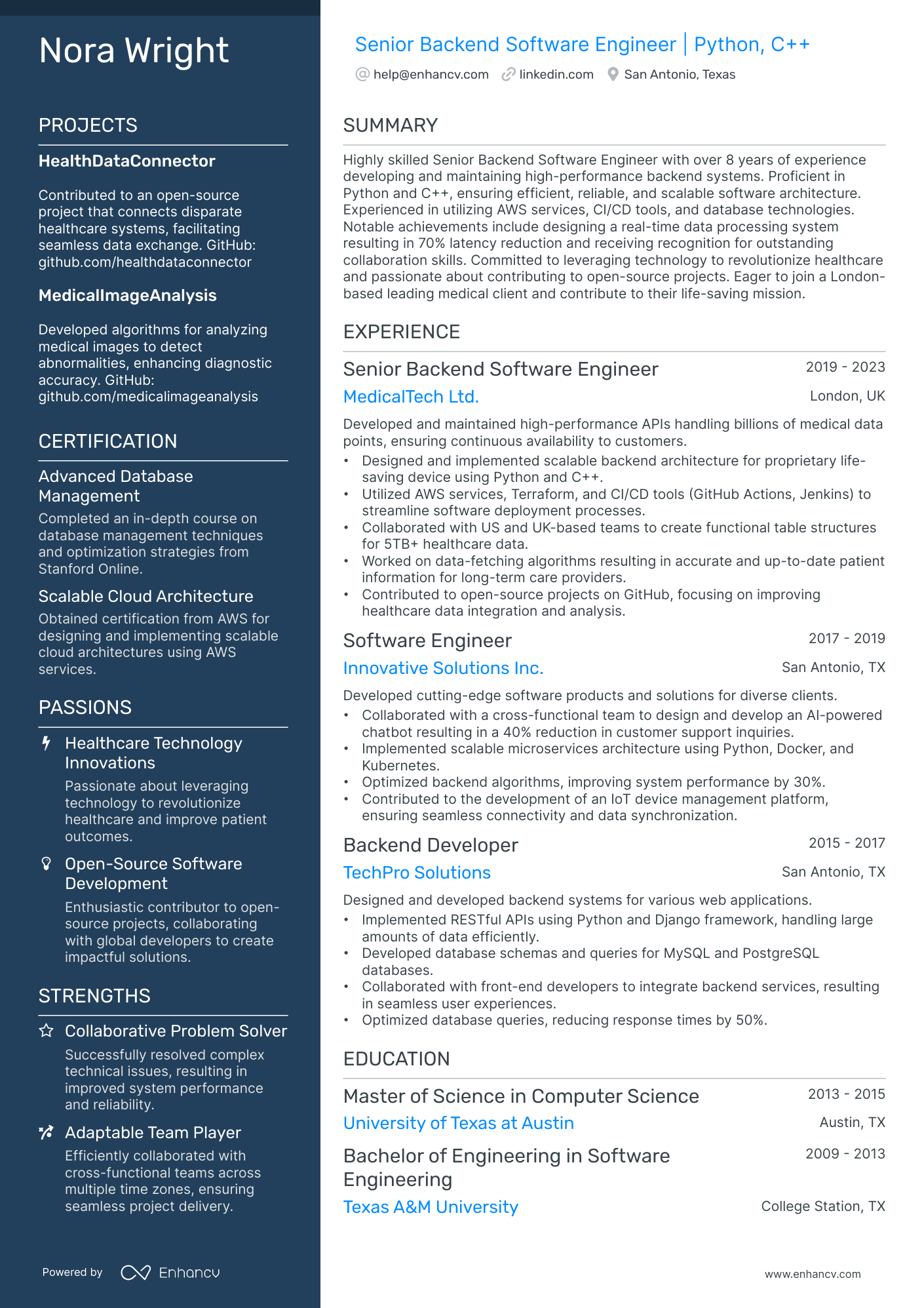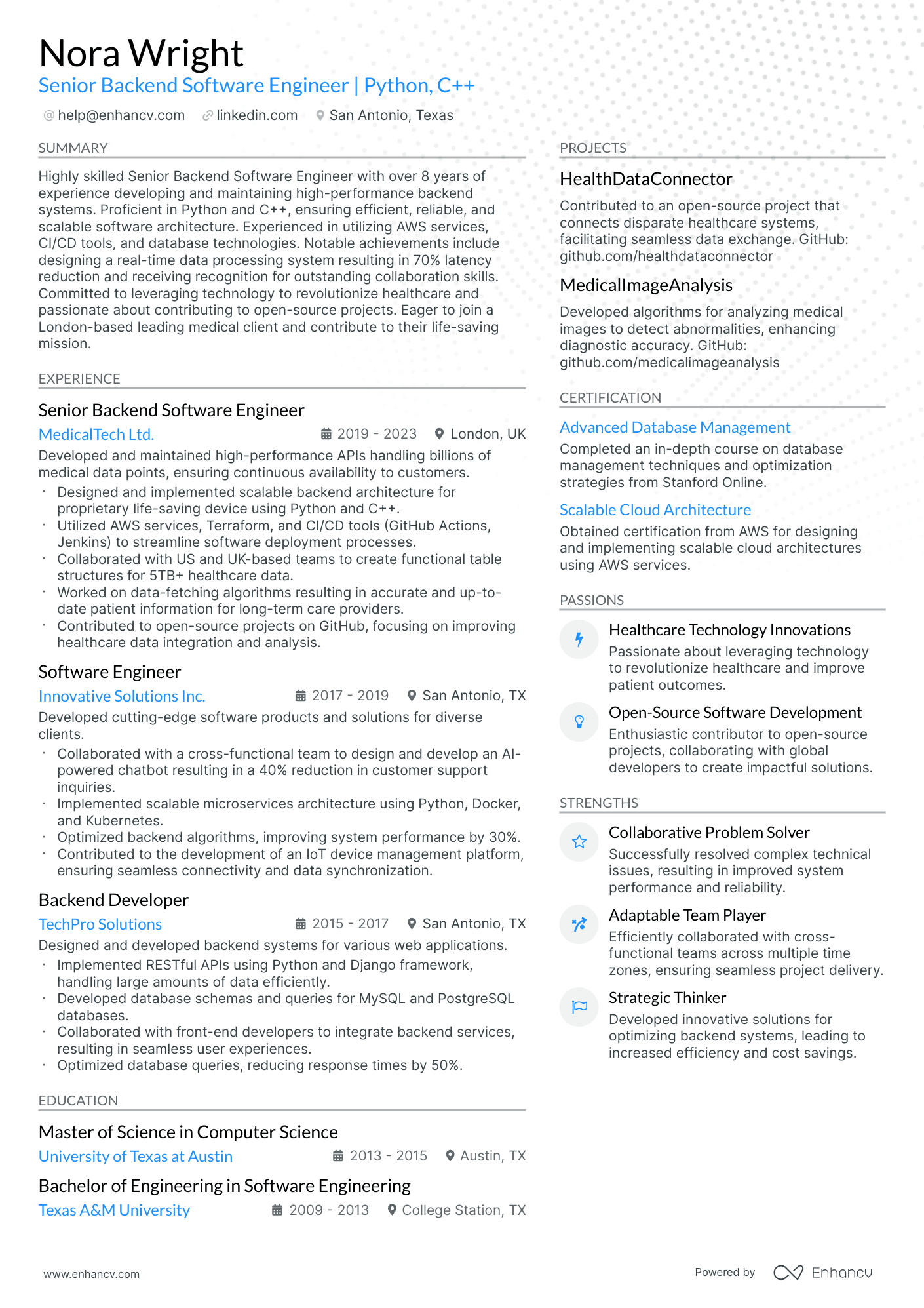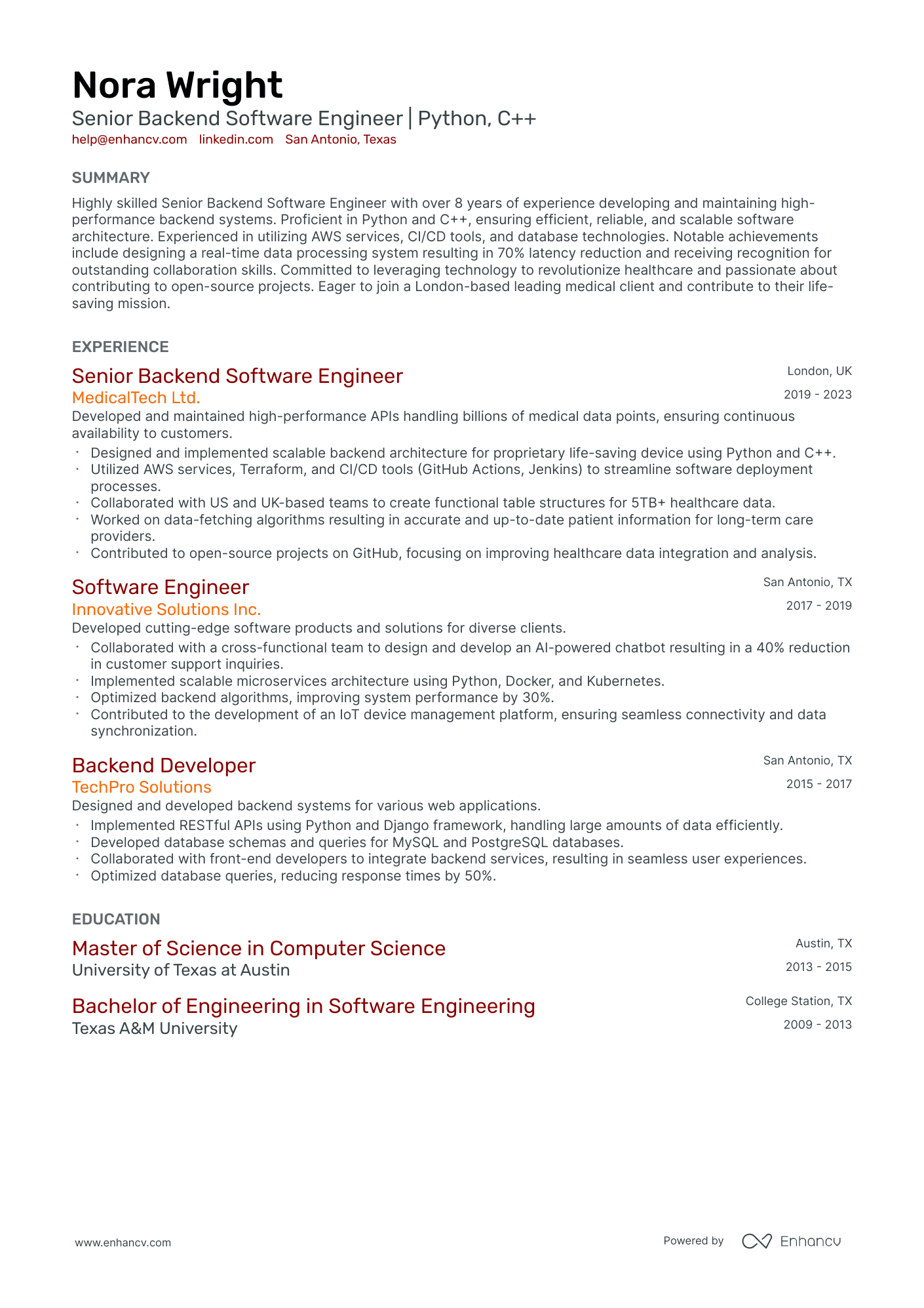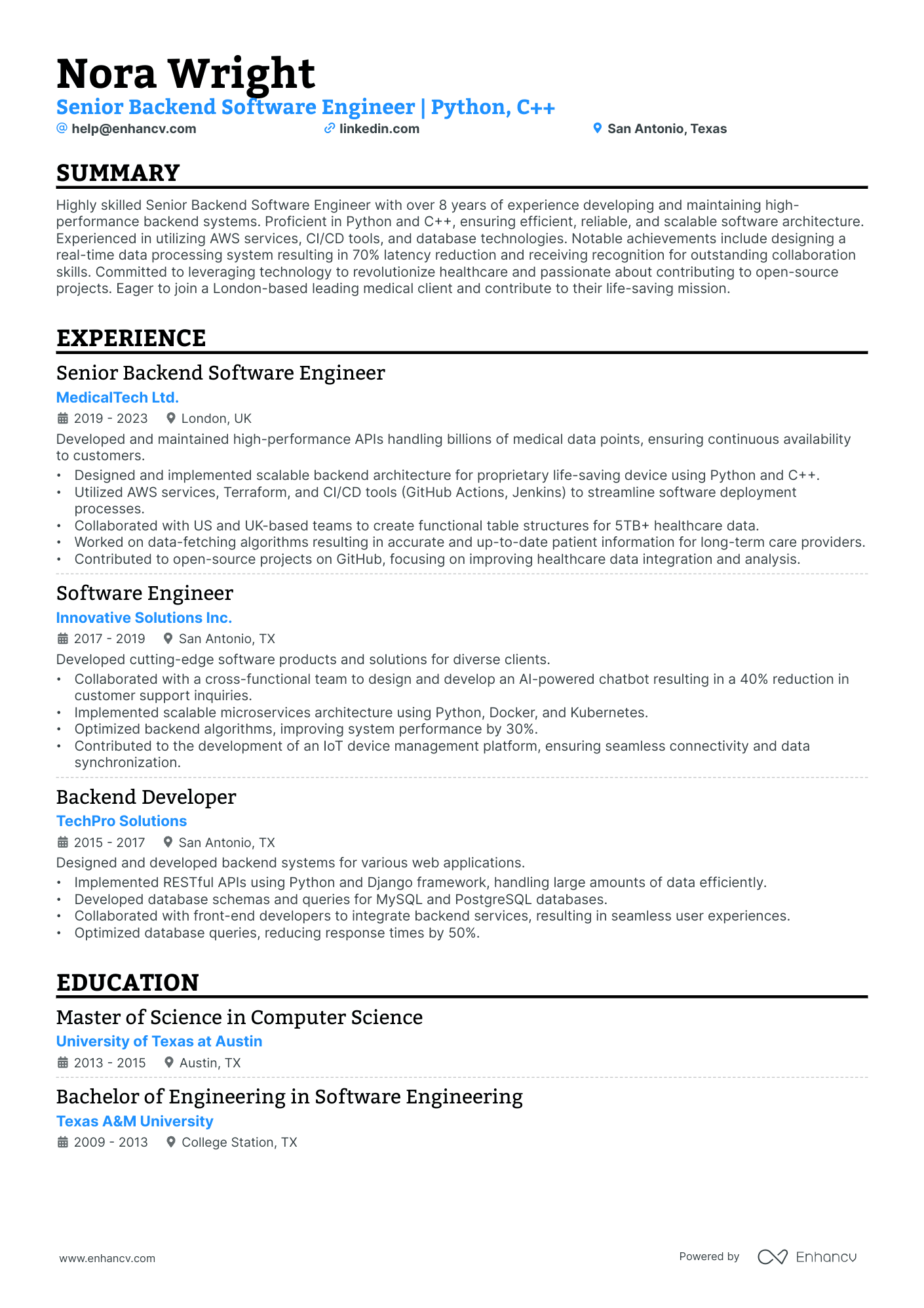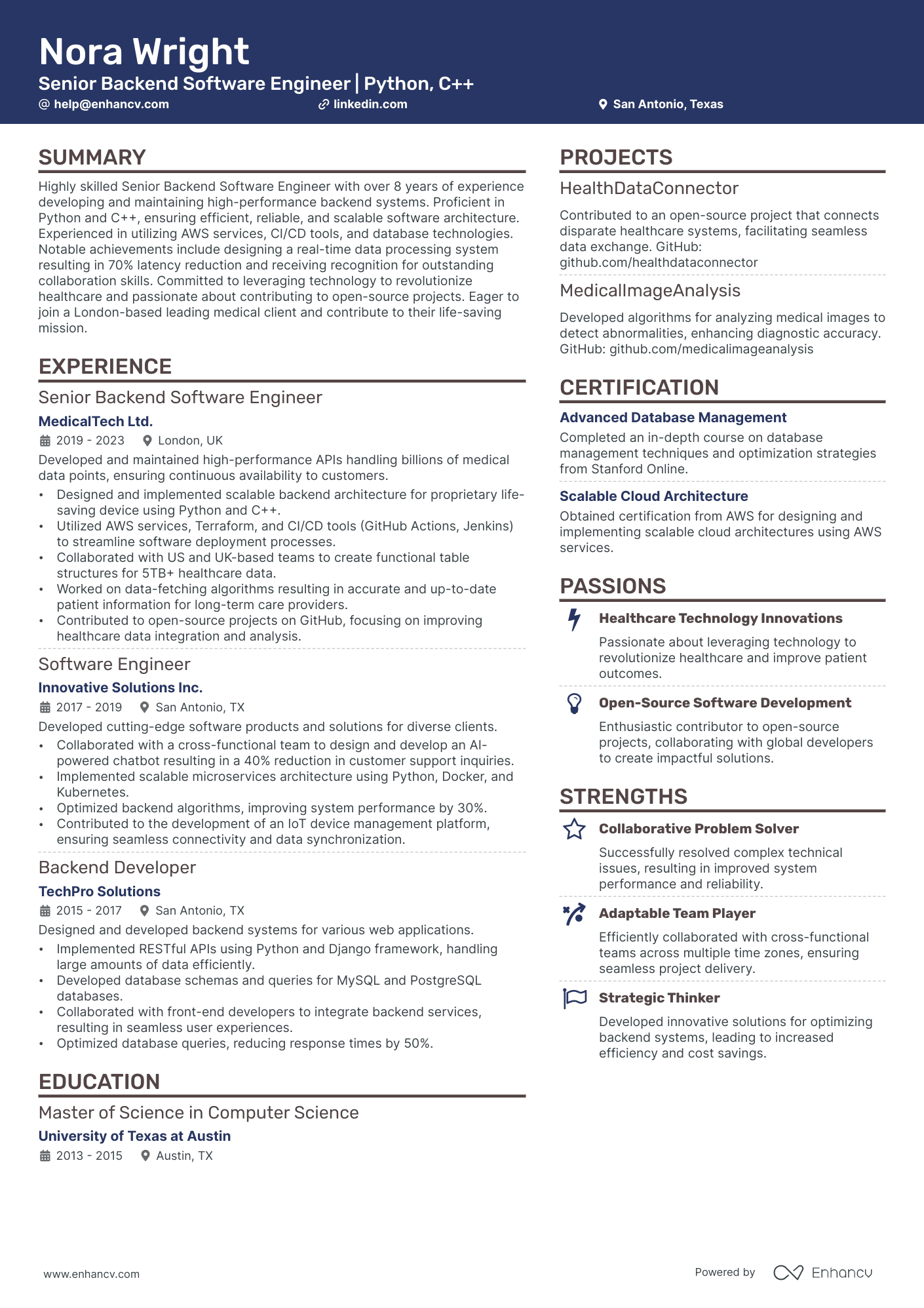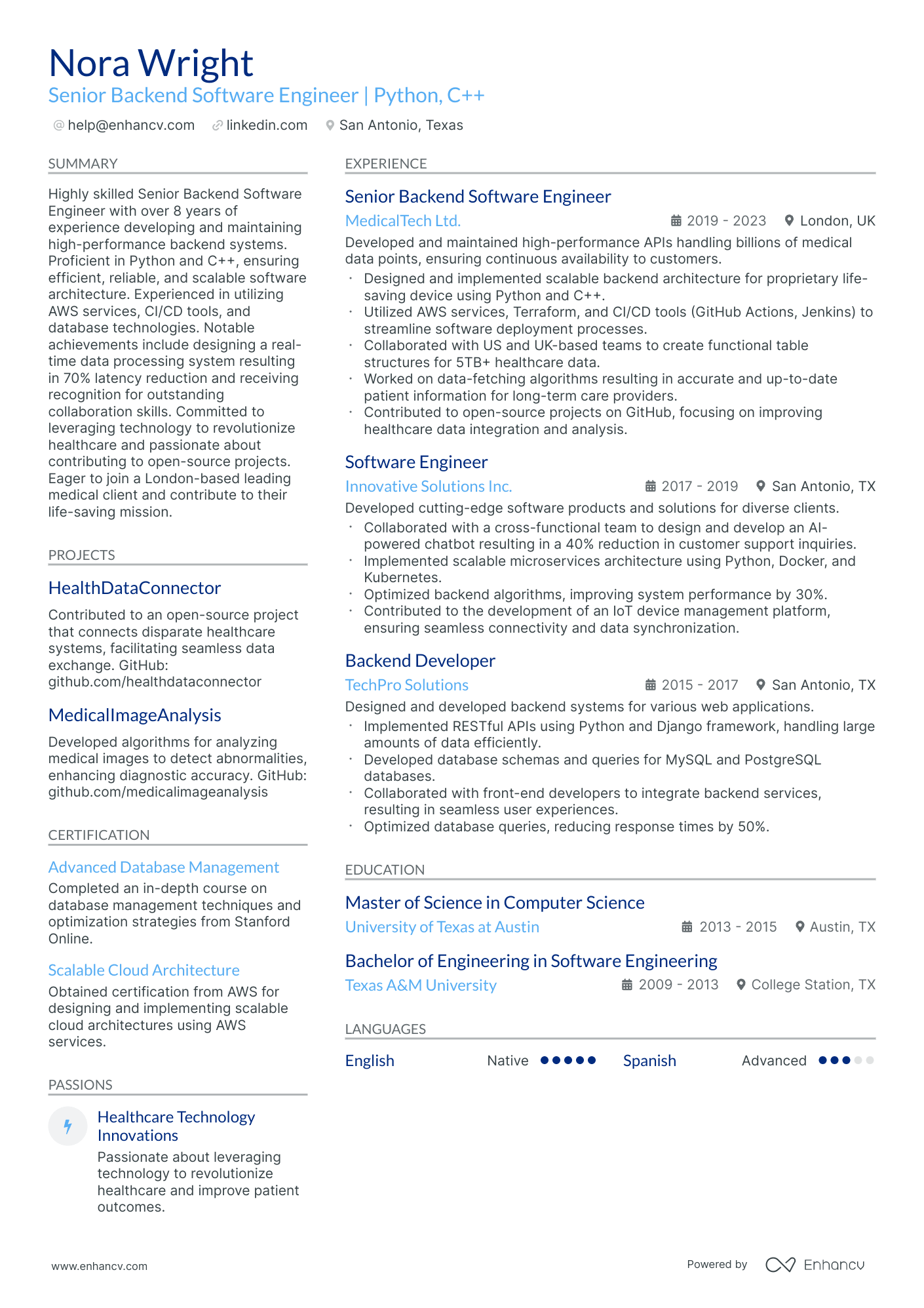A common resume challenge faced by AWS devops professionals is effectively communicating the complexity and impact of their cross-functional work to potential employers who may not be familiar with the specifics of DevOps practices. Our comprehensive guide can assist in this area, providing clear strategies and language suggestions for presenting your multifaceted skills and accomplishments in a way that resonates with hiring managers, regardless of their DevOps knowledge level.
Dive into this guide to discover how to craft a compelling AWS devops resume:
- Explore top-tier AWS devops resume samples, spotlighting industry-leading skills and experiences.
- Uncover over ten tailored strategies to make your AWS devops resume resonate with the job description.
- Illuminate your unique value as a AWS devops candidate, using your professional achievements as a guide.
- Debunk the myth that education doesn't matter, and learn how to leverage your academic and certification credentials effectively.
Recommended reads:
Deciphering the best format for your AWS devops resume
To craft an impactful AWS devops resume, start by thoroughly analyzing the job description.
Your chosen resume format should seamlessly align your experience with the role's requirements.
Consider these four pivotal elements:
- Present your experience effectively. If you boast a wealth of pertinent experience, employ the reverse-chronological resume format, listing roles by date, beginning with the most recent.
- Maintain brevity. Limit your resume to a maximum of two pages, focusing on your most salient attributes.
- Headers serve a purpose. A well-crafted header ensures recruiters can swiftly access your contact details and professional portfolio.
- Opt for PDF. Typically, submit your AWS devops resume in PDF to preserve its layout. However, always adhere to specific job application guidelines.
Different markets have specific resume styles – a Canadian resume, for instance, may require a different approach.
Upload your resume
Drop your resume here or choose a file. PDF & DOCX only. Max 2MB file size.
Pro tip
Keep your AWS devops resume clear and concise. Top professionals narrate their career stories while highlighting their strengths.
Essential components for your real estate attorney resume:
- Header: Feature your name prominently. If you have a notable degree or certification, append it next to your name. Include contact details, a link to your portfolio, and a concise headline.
- Summary or Objective: Align your professional trajectory and standout achievements with the desired role.
- Experience: Craft concise bullet points, highlighting tangible successes and contributions.
- Skills: Showcase them throughout your resume and consider a dedicated sidebar for emphasis.
- Education & Certifications: Reinforce your credibility and demonstrate your commitment to the industry.
What recruiters want to see on your resume:
- Extensive experience with AWS services: EC2, S3, RDS, Lambda, CloudWatch, CloudFormation, etc.
- Proficiency in automation and configuration management tools such as Ansible, Chef, Puppet, or Terraform.
- Strong knowledge of CI/CD pipelines via tools like Jenkins, GitLab CI/CD, AWS CodePipeline, etc.
- Scripting and coding skills in languages such as Python, Bash, or Ruby for automating tasks.
- Demonstrated understanding of containerization and orchestration using Docker and Kubernetes.
Recommended reads:
Decoding the AWS devops resume experience section
Once you've settled on your resume's format, the next step is detailing your professional journey.
Many AWS devops professionals grapple with this section, especially when balancing between extensive or limited experience. Here's a roadmap to navigate this:
- Limit bullet points under each job role to six, focusing on high-impact contributions.
- Highlight achievements that resonate with the job's requirements, rather than just listing duties.
- Detail any on-the-job certifications or skills acquired and their relevance to your growth.
- Choose impactful verbs for each bullet, avoiding overused terms like "managed".
- Infuse relevant keywords from the job posting, especially in the context of accomplishments.
For more insights, explore these curated examples from seasoned AWS devops professionals:
- Implemented and maintained AWS infrastructure, including EC2 instances, S3 buckets, and RDS databases.
- Developed CI/CD pipelines using Jenkins and AWS CodePipeline, resulting in a 30% reduction in deployment time.
- Optimized application performance by implementing auto-scaling groups and load balancing on AWS Elastic Beanstalk.
- Designed and implemented disaster recovery strategies using AWS services such as CloudFormation and Route53.
- Collaborated with development teams to troubleshoot and resolve production issues, reducing downtime by 20%.
- Deployed and managed applications on AWS cloud infrastructure, utilizing EC2, S3, and Lambda functions.
- Automated infrastructure provisioning using Terraform, reducing deployment time by 40%.
- Implemented monitoring and alerting solutions with CloudWatch, resulting in improved system reliability.
- Collaborated with cross-functional teams to migrate on-premises applications to AWS, ensuring minimal downtime during the transition.
- Led a team of engineers in designing and implementing a scalable microservices architecture on AWS ECS.
- Managed and administered AWS infrastructure, including EC2 instances, S3 buckets, and VPC configurations.
- Implemented automated deployment processes using Ansible, resulting in a 50% reduction in deployment time.
- Optimized application performance by implementing caching strategies with Redis and CDN services.
- Implemented security measures on AWS, including IAM roles, security groups, and VPC peering.
- Worked closely with development teams to design and implement scalable, fault-tolerant architectures on AWS.
- Provisioned and managed virtualized environments using VMware and deployed applications on AWS EC2 instances.
- Implemented backup and disaster recovery solutions, resulting in reduced data loss and improved system availability.
- Developed scripts and automation tools using Bash and Python for infrastructure management tasks.
- Collaborated with the development team to optimize application performance and troubleshoot production issues.
- Provided technical support and training to internal teams for AWS-related technologies and best practices.
- Managed AWS infrastructure, including EC2 instances, RDS databases, and VPC configurations.
- Implemented infrastructure as code using CloudFormation, reducing deployment time and ensuring consistency across environments.
- Designed and implemented highly available and fault-tolerant architectures on AWS using Auto Scaling and Elastic Load Balancing.
- Developed and maintained CI/CD pipelines using Jenkins and Git, resulting in faster and more reliable deployments.
- Performed regular security audits and implemented necessary measures to ensure compliance with industry standards.
- Managed and monitored AWS infrastructure, including EC2 instances, S3 buckets, and CloudFront distributions.
- Implemented backup and disaster recovery solutions using AWS services like Glacier and EBS snapshots.
- Collaborated with development teams to optimize application performance and troubleshoot production issues.
- Automated deployment processes using AWS CloudFormation templates, reducing manual errors and improving efficiency.
- Implemented security best practices on AWS, including encryption at rest and in transit for sensitive data.
- Deployed and managed AWS resources, including EC2 instances, S3 buckets, and RDS databases.
- Implemented scalable and fault-tolerant architectures using AWS services such as Auto Scaling and Elastic Load Balancing.
- Designed and implemented CI/CD pipelines using Jenkins and Git, resulting in faster and more reliable software releases.
- Configured and maintained monitoring and alerting systems using AWS CloudWatch and third-party tools.
- Provided technical support to development teams and stakeholders, resolving critical production issues promptly.
- Managed and optimized AWS infrastructure, including EC2 instances, VPC configurations, and S3 storage.
- Developed and implemented automation scripts using Python and Ansible, resulting in improved operational efficiency.
- Implemented high availability and disaster recovery strategies using AWS services like Multi-AZ RDS and S3 replication.
- Collaborated with cross-functional teams to migrate legacy applications to AWS, ensuring minimal disruption to business operations.
- Performed regular security assessments and implemented necessary measures to protect sensitive data on AWS.
- Managed and maintained AWS infrastructure, including EC2 instances, S3 buckets, and DynamoDB databases.
- Designed and implemented scalable architectures using AWS services such as Lambda, API Gateway, and SQS.
- Automated deployment processes using AWS CloudFormation and Infrastructure as Code principles.
- Optimized application performance by leveraging AWS services like Elastic Load Balancing and Auto Scaling.
- Collaborated with development teams to troubleshoot and resolve complex production issues effectively.
- Architect and manage AWS infrastructure, including EC2 instances, RDS databases, and ECS clusters.
- Implement and maintain CI/CD pipelines using AWS CodePipeline, Jenkins, and Git for automated software delivery.
- Design fault-tolerant and highly available systems using AWS services like Route53 and Elastic Beanstalk.
- Implement monitoring and alerting solutions with CloudWatch and third-party tools for proactive system management.
- Collaborate with cross-functional teams to optimize costs and ensure security compliance on AWS.
Quantifying impact on your resume
<ul>
Writing your AWS devops experience section without any real-world experience
Professionals, lacking experience, here's how to kick-start your AWS devops career:
- Substitute experience with relevant knowledge and skills, vital for the AWS devops role
- Highlight any relevant certifications and education - to showcase that you have the relevant technical training for the job
- Definitely include a professional portfolio of your work so far that could include university projects or ones you've done in your free time
- Have a big focus on your transferable skills to answer what further value you'd bring about as a candidate for the AWS devops job
- Include an objective to highlight how you see your professional growth, as part of the company
Recommended reads:
Pro tip
Boost your resume by focusing on the practical aspects of each job requirement. While it's good to have job-related keywords on your resume, ensure they're backed by action verbs and quantifiable data. This gives recruiters a clear picture of your AWS devops professional journey.
Highlighting your hard and soft skills on your AWS devops resume
The skills section of your AWS devops resume should showcase your capabilities that align with job requirements.
Your hard skills, or technical skills, demonstrate your proficiency with technological innovations and specific software. On the other hand, your soft skills illustrate how you'd excel in the workplace environment with personal attributes like resilience, negotiation, and organization.
For a well-rounded AWS devops resume, it's essential to include both. Here's how to craft a standout skills section:
- Prioritize skills listed at the top of the job advert.
- Highlight unique skills you've honed over time.
- Choose soft skills that resonate with the company or department culture.
- Address essential job requirements by listing key skills for the AWS devops role that haven't been mentioned elsewhere in your resume.
Check out our sample skill list for AWS devops to get ideas on the most sought-after hard and soft skills in the industry.
Top skills for your AWS devops resume:
AWS (Amazon Web Services)
Docker
Kubernetes
Terraform
CI/CD (Continuous Integration/Continuous Deployment)
Ansible
Git
CloudFormation
Linux
Monitoring Tools (e.g., CloudWatch, Prometheus)
Problem Solving
Collaboration
Communication
Time Management
Adaptability
Critical Thinking
Attention to Detail
Leadership
Creativity
Conflict Resolution
Pro tip
If the job emphasizes team or organizational culture, dedicate a section of your resume to underscore your strengths and achievements. Top-tier AWS devops candidates also highlight their alignment with a company's values and culture.
how to properly list your resume's education and certifications
Don't underestimate the importance of your resume education section , as it oftentimes helps you further tailor your resume to the job ad.
When writing your education section:
- Include the most relevant degree you have with information about the institution and dates of start and completion;
- If you're in the process of obtaining your degree, include your expected graduation date;
- Consider leaving off degrees that aren't relevant to the job or industry;
- Add bullet points to show how you gained valuable experience relevant for the job in an academic environment.
When describing your resume certifications , always consider their relevancy to the role.
Use the same format to describe them as you will for your education. If you're wondering what are the best certificates for AWS devops roles, check out the list below.
Best certifications to list on your resume
Pro tip
Listing your relevant degrees or certificates on your AWS devops resume is a win-win situation. Not only does it hint at your technical capabilities in the industry, but also at a range of soft skills, including perseverance, adaptability, and motivation.
Recommended reads:
Summary or objective: maximizing the impact of the top third of your resume
The top third of your AWS devops resume is crucial. It's often the first thing recruiters see and can set the tone for the rest of your application.
Whether you choose a resume summary or a resume objective, make it count. The former is great for showcasing career highlights, while the latter balances your achievements with your future aspirations.
Both should be tailored to the role, as there's no universal approach to crafting the perfect AWS devops summary or objective. Use the examples below as a starting point.
Resume summary and objective examples for a AWS devops resume
Extra sections to include in your AWS devops resume
What should you do if you happen to have some space left on your resume, and want to highlight other aspects of your profile that you deem are relevant to the role?
Add to your AWS devops resume some of these personal and professional sections:
- Passions/Interests - to detail how you spend both your personal and professional time, invested in various hobbies;
- Awards - to present those niche accolades that make your experience unique;
- Publications - an excellent choice for professionals, who have just graduated from university or are used to a more academic setting;
- < a href="https://enhancv.com/blog/volunteering-on-resume/"> Volunteering - your footprint within your local (or national/ international) community.
Key takeaways
- Format your AWS devops resume for clarity and coherence, ensuring it aligns with the role.
- Highlight key sections (header, summary/objective, experience, skills, certifications) within your AWS devops resume.
- Quantify achievements and align them with skills and job requirements.
- Feature both technical and personal skills across your resume for a balanced portrayal.
